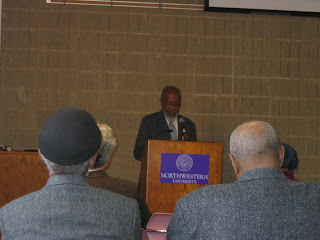Ed, whom I think of as a sage, is teaching two classes, and as part of his visit and the courses, he planned a one-day conference on the Black Arts Movement in the Broader Legacy of the Civil Rights Movement, with special emphasis on its history in Chicago. The event brought three of the central figures from the Chicago branch of that movement, writers Angela Jackson, Carolyn Rogers, and Sterling Plumpp, to campus to talk about their experiences as poets and activists. (This was pretty significant in that Chicago, where the Organization of Black American Culture (OBAC), was established in 1966, was an important center for Black Arts poetry and the Black Power movement--one of the key Black Panthers branches was in the city; Fred Hampton and Mark Clark were assassinated in a joint FBI Cointelpro-Chicago Police Department assault in 1969--and yet it is often passed over in scholarly and artistic discussions on this topic.) In addition, Ed invited his friend Sala Udin, who took many of the ideas he'd gained in the movement back to his hometown of Pittsburgh, where he's been an actor in the plays of his friend and fellow poet, and later one of the greatest American playwrights, August Wilson, while also serving as a city councilor and arts and community activist. One of his successes is Pittsburgh's August Wilson Center for African American Culture.
Hearing the speakers talk about the history of the movement in Chicago filled in so many gaps in my knowledge. All spoke of the crucial roles that Gwendolyn Brooks and Hoyt Fuller played in encouraging artists, artmaking and activism. Sterling Plumpp's comments about his friendship and work with Dennis Brutus, then teaching at the university, and the relationship between African-American and South African poets, who were battling for freedom and an end to the oppressive apartheid system, was revelatory. He spoke at length about the intricacies of Left-politics and how these played a role in the positions people took, both in terms of the Black Arts movement members and the African National Congress. (I sometimes have to remind myself that at one point, Brutus, Jan Carew, and Leon Forrest all taught at the university--but simultaneously? I think of this constellation of Black creative writer-intellectuals with considerable awe.) Plumpp also noted that he wished he and others had taken on the issues of gender and sexism, and, as he put, "gender and sexual choice" (I think I transcribed that right) more forcefully. This led one of Ed's students, who prepared an excellent overview of the movement, to ask the panelists about their feelings on Fuller, who was gay, and despite the extremely problematic nature of the term "sexual choice," they all argued there was no hostility towards Fuller (who, Jackson noted, most did not know was gay), nor homophobia among any of them.
Concluding the event, my colleague Alex Weheliye gave a brief yet thorough response to the talks and panel discussion.

Ed Roberson introducing the speakers (Sam Greenlee and Sterling Plumpp are the two poets in the foreground)

Angela Jackson, offering a history lesson on the Black Arts Movement in Chicago

Carolyn Rogers, who Ed characterized as a "metaphysical" poet, talking about her experiences with the local poets

Ed, and the panelists (Rogers, Salah Udin of Pittsburgh, Jackson, Plumpp)

My colleague Alex Weheliye, who gave a fitting response
***
In addition to slipping in briefly to today's late afternoon conversation between Haki Madhubuti and Sonia Sanchez, whom I could listen to for hours (and who was one of the best workshop leaders I ever had) at Chicago State University's annual Gwendolyn Brooks Conference, I went to hear two poets I admire tremendously, A. Van Jordan and Tyehimba Jess, present their work this past Wednesday at the Poetry Center of Chicago's reading down at the School of the Art Institute of Chicago. It was a rainy night, I'd had a long day, and it took forever to get downtown from Evanston, and parking is scarce downtown, but I did get to hear Van and spend some time with both poets, as well as Tasha Tarpley and Toni, who brightens any room she enters. Cue the photos:

Van on stage, Jess in the foreground

Van answering a question from Francesco of the Poetry Center

Jess and Toni

Van signing books






Wow! You have been busy-busy! Thanks for sharing all of this rich exposure to history, poetics, etc. you've been benefitting from as of late. It's so great you have Roberson in residence! And Mary Anne Mohanraj upcoming--now that's wild! Mr. Gibbons is making his time in that position really stand for something, that's inspiring!
ReplyDeleteAudiologo, reading manuscripts (sooooooooooooo many) occupies most of my time, so much in fact that I can hardly bear to read anything else right now! But these events have been both enjoyable and energizing, which is crucial these days. How did your events go?
ReplyDeleteGreat days in the Windy City! Thanks for the photos John. BTW did anyone at the Black Arts event mention their Chicago-based musical component, the amazing AACM?
ReplyDeleteI'm also jealous of you being out there with Ed Roberson! LOL
Reggie, they did mention the AACM, and talked about how OBAC didn't take on music because AACM was doing that. They also spoke at length about Baraka and Kawaida, among other things. A fascinating talk. Ed reads tomorrow. I'm really looking forward to it!s
ReplyDelete